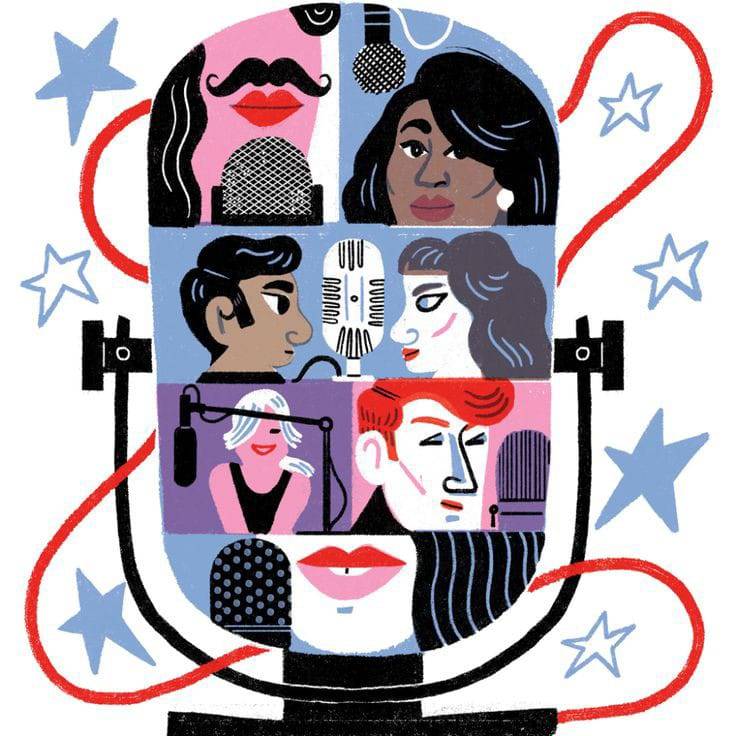*knock knock*
*cue footsteps*
So, you’re here wanting to write an audio drama podcast? First, congratulations on choosing one of the most challenging, creative, and most addictive forms of storytelling. Second, giddy up. Writing for audio dramas isn’t all easy, it’s more like navigating a thick forest with nothing but your brain, a pen, and maybe a mug of tea.
Writing an audio drama podcast isn’t just about throwing some dialogue onto a page and hoping for the best. It takes a unique combination of skills, and at the top of the list is dialogue. Dialogue isn’t just important here; it’s the major soul of your story.
Each character needs a voice so differentiated; you could know them blindfolded. Think of it this way: if your characters were in a lineup, could someone pick them out just from their lines? Your goal is to write dialogue that shows real different personalities, relationships, and even the story’s plot.
Other stuff comes into consideration depending on your personal style. For example:
If you’re aiming for little to no narration, your dialogue must pull double duty shift, giving exposition and world-building. This doesn’t mean characters suddenly start saying lines like, “Wow, what a sunny day in post-apocalyptic New York!” It means blending the details naturally into the conversation. Scene-setting is often done through sound effects, rain tapping on windows, footsteps echoing in a hall, or the flash of fluorescent lights. These sounds should complement your exposition rather than replace it. A good balance makes sure you’re not beating your audience over the head with either.
Even the best writers stumble with this balance. Before you start plotting your 12-episode space opera with a cast of 50, stop. Take a breath. For your first try, keep it simple:
- Write a short, single-episode audio play.
- Limit your cast to a few characters.
- Work with limitations, consider how many voice actors, effects, and resources you realistically have.
Think of this as your sandbox. The smaller and simpler the story, the more you can focus on learning the little quirks of audio storytelling.
Also, remember: this is not a novel. You don’t have the luxury of internal monologues, elaborate descriptions, or footnotes. The only way to tell your story is through sound, dialogue, effects, and music. Use a narrator if you need a little extra help, but don’t rely on them to do all the heavy lifting.
There’s no magic formula for writing an audio drama. The best way to learn? Write something and perform it. Seriously, grab a friend, a microphone, or even just your phone. Read your script out loud and act it out.
Hearing your script come to life will teach you more than any guide ever could. You’ll quickly notice when dialogue feels clunky, when pacing drags, or when sound effects are overkill. Fixing these issues in real-time will sharpen your skills.
Don’t Bite Off More Than You Can Chew
This point cannot be stressed enough. Your first podcast isn’t the time to recreate Game of Thrones in audio form. Every additional character, plotline, or episode adds complexity, and trust me, that complexity will snowball faster than you expect.
Instead, start with:
- Short episodes (15-20 minutes).
- A single, clear storyline.
- A small, manageable cast.
You can expand later once you’ve got the hang of it. But for now, keep it simple to avoid burnout. (And yes, that advice comes from the experiences of the ones before you.)
One of the biggest mistakes new creators make is creating in a vacuum. You might think your idea is brilliant, and it probably is, but you need to test it with real people.
- Get Feedback: Share your premise, podcast cover, and scripts with others. Platforms like Fiverr, writing communities, or even Reddit can connect you with people who’ll give honest critiques.
- Look out for Reactions: Talk to friends or strangers. Explain your idea without mentioning it’s for a podcast. Do their eyes light up, or do they politely change the subject?
- Iterate: Use the feedback to tweak your story. Remember, the goal is to create something that resonates with an audience, not just you.
If your project is a deeply personal passion piece, that’s awesome, but understand that it might not connect with everyone. And that’s okay, too.
It’s very rare that you will have overnight success, but don’t let that discourage you. Success in the audio drama world often comes with persistence and patience. Your audience will build gradually, but only if you give them a chance to find you.
This means:
- Promo Swaps: Collaborate with other podcasts in your genre. Swapping promos is an excellent way to reach like-minded audiences.
- Feed Drops: Partner with similar podcasts to drop an episode into their feed, and vice versa.
- Paid Ads: Consider investing in targeted ads to boost visibility. Platforms like Spotify or Instagram can be great for reaching your audience.
- Social Media: Be active on platforms where your potential listeners hang out. Share behind-the-scenes content, teasers, or fun facts about your show.
People won’t discover your podcast unless it’s put in front of their faces. So, put on your marketing hat and get to work!
Writing the script is just the beginning. Once production starts, you’ll likely find yourself handling multiple roles, director, editor, sound designer, and marketer, to name a few.
Here’s how to make it manageable:
- Outsource When Possible: Hate editing? Find someone to do it for you. Decent sound design and music can elevate your show and are worth investing in if your budget allows.
- Music: Music is the “cinematography” of audio dramas. It can set the tone, highlight emotions, and even help identify characters or locations.
- Sound Design: You don’t need every footstep, door creak, or pencil scratch. Sometimes, less is more. Use sound effects to enhance key moments rather than overload every scene.
Tips for Writing: The Little Details
- Use Character Names: At least once per scene, have someone address another character by name. It helps listeners keep track of who’s who.
- Start Strong: Hook your audience in the first minute with something intriguing, an unexpected sound, a hot line, or an unusual scenario.
- Experiment with Format: Linear storytelling is great, but audio allows for creative freedom. Try unreliable narrators, nonlinear timelines, or breaking the fourth wall.
- Revise, Revise, Revise: Your first draft is just that, a draft. Edit ruthlessly to tighten dialogue, improve pacing, and refine your sound cues.
At the end of the day, this should be a result of love. Lean into the parts of the process you enjoy most, whether it’s writing quirky characters, experimenting with soundscapes, or writing snappy dialogue.
And don’t sweat the mistakes, they’re part of the journey. Every mistake teaches you something valuable, and every success (no matter how small) is a step closer to creating an audio drama you’re proud of.
So, grab your mic, your script, and maybe a bucket of coffee. The world is ready to hear your story.




I really love your articles…❤❤